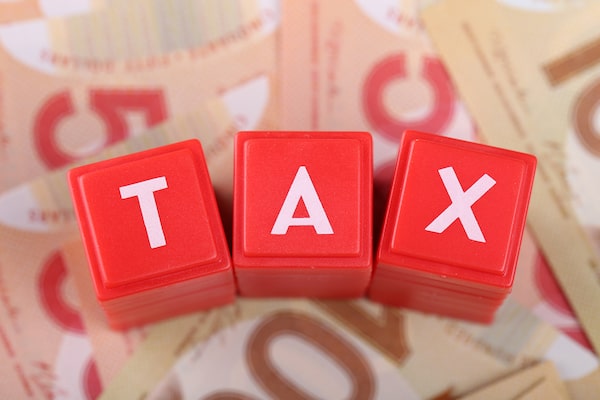
Potential tax changes include an increase to the top personal income tax rate, the introduction of a new estate tax and an increase to the capital gains inclusion rate.J&J Studio/iStockPhoto / Getty Images
Financial advisors are warning their clients – especially those who have higher levels of net worth – to start planning for higher taxes as all levels of government seek to repay their already historic, and still rising, pandemic-related debt.
Although estimates range widely over the exact timeline of when the federal government will implement tax hikes, Faisal Karmali, portfolio manager and investment advisor at CIBC Wood Gundy in Calgary, says other levels of governments have already began to take such measures.
“We in the advisor community spend too much time looking at federal guidelines and very little time looking at provincial or municipal taxes, but in Calgary, for example, residential property taxes have gone up as well as commercial and business-commercial taxes,” Mr. Karmali says. “That’s still an erosion of capital that clients could be using for their lifestyle, so we need to be planning for those levels of tax changes as well.”
Martin Pelletier, managing director and portfolio manager at Wellington-Altus Private Counsel Inc. in Calgary, says he’s already bringing up the expectation for a higher tax burden during client meetings and beginning to tweak their financial plans to prepare for that reality.
“We don’t want to be reactive to changes that are expected to come soon, we want to be proactive,” Mr. Pelletier says. “And it isn’t like we are going to be guessing ... we know, to a fairly large degree, what’s going to happen.”
Earlier this month, the federal government projected that the deficit for this fiscal year is likely to surpass $343-billion because of spending on pandemic-related aid programs. The amount is proportional to Second World War-era government spending and is already on track to almost double total federal debt in a single fiscal year.
Some of the tax increases Mr. Pelletier is expecting in the near future as part of a broad debt-repayment strategy include an increase to the top federal personal income tax bracket to 36 per cent (from 33 per cent today) and a new estate tax and an increase to the capital gains inclusion rate to 75 per cent from 50 per cent, which would effectively halve the tax-free portion of any capital gains clients make.
While he cannot be certain, Mr. Pelletier says his “predictions do have some high probability associated with them. … I am fairly connected with various people who I believe would know.”
Jeff Kaminker, president and chief executive officer of Frontwater Capital in Toronto, is not convinced that such tax increases are coming soon.
“We’re living in an economic environment right now where the government is doling out cheques and free money to anyone over the age of majority. The last thing the government is going to want to do right now is shrink the money supply by taxing its citizens more,” he says.
“Sure, if the economy becomes overheated, then a tax increase is a possibility, but in the presence of COVID-19 and in the absence of any real economic boom … the government is not going to be changing the tax structure. And even if [taxes did increase], we always say to our clients that we don’t let taxes alone drive investment decisions.”
Nevertheless, Mr. Kaminker says advisors should already be recommending that clients maximize their registered and tax-sheltered investment vehicles, such as their registered retirement savings plans, tax-free savings accounts or individual pension plan.
“Raising the marginal tax rate just increases the value of those tax-sheltered plans to the high-net-worth community,” he says, “but it doesn’t really change their investment strategy.”
Mr. Kaminker also questions the need for governments to address their rapidly-expanding debt loads in an urgent manner.
“The argument that governments are running up all these deficits and someone has to pay for it and we just can’t keep on kicking the can down the road here is not exactly true,” he says. “The traditional fear of running large deficits is your currency devalues, but if every other government in the world is also running large deficits to tackle the same crisis, then we are in a relative field in which you won’t see devaluation.”
There’s also some risk associated with financial plans built around what are essentially political assumptions. That’s why even though Mr. Karmali is convinced tax hikes are coming eventually, he and his colleagues “shy away from giving a timeline,” he says.
“Executing on a tax strategy that hasn’t been put through Parliament could end up being a disaster for some. They could end up paying some tax unnecessarily,” Mr. Karmali says.
Mr. Kaminker says a good example of that was in 2015 when Prime Minister Justin Trudeau was first elected.
“A lot of people were concerned that capital gains would be taxed more heavily, so some investors unnecessarily triggered profits earlier than they would have otherwise in order to avoid what they thought was going to be a higher tax liability,” he says. When the hike didn’t happen, “that proved to be a poor strategy.”
Despite those concerns, Mr. Pelletier says advisors should also be trying to address the sources of financial stress their clients face, which requires a major focus on where tax policy is headed – and when.
“There has been a lot of anxiety among advisors’ clients lately, and that’s not unusual given the situation. Markets have stabilized somewhat, so that has addressed some of the anxiety,” he says, “but one remaining [source of that] anxiety would be the taxes.”